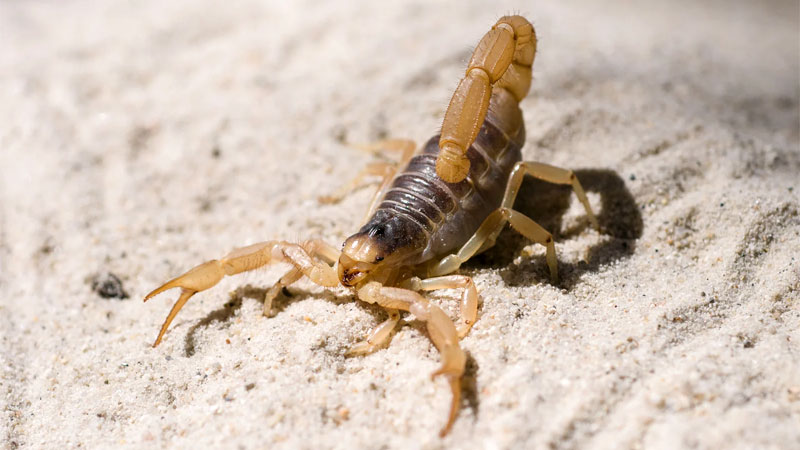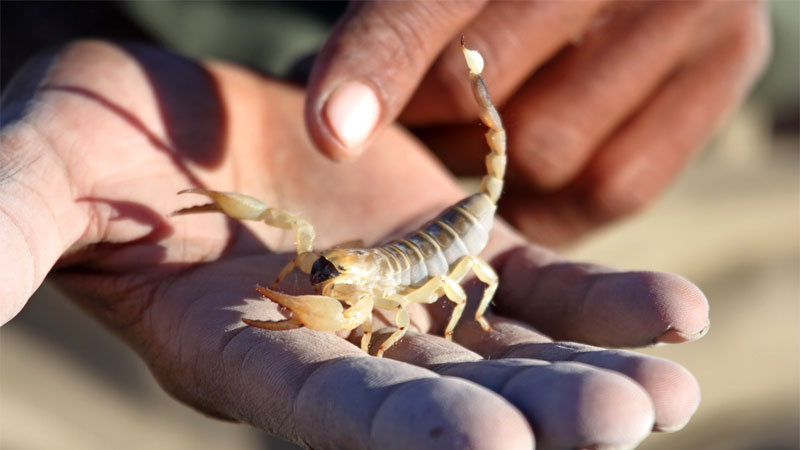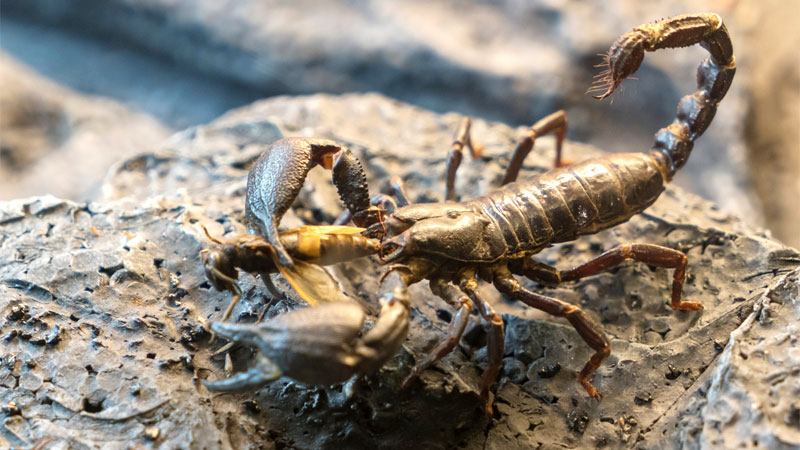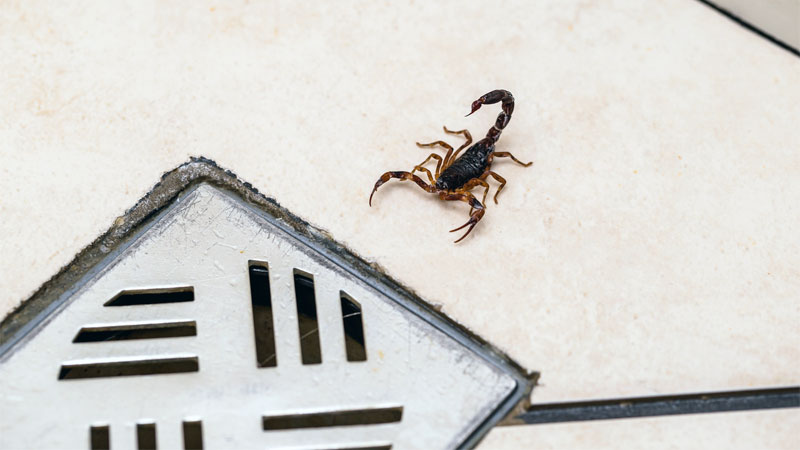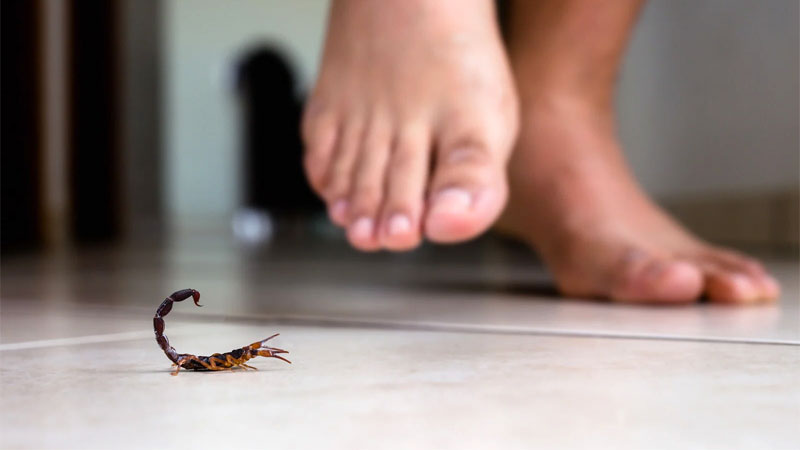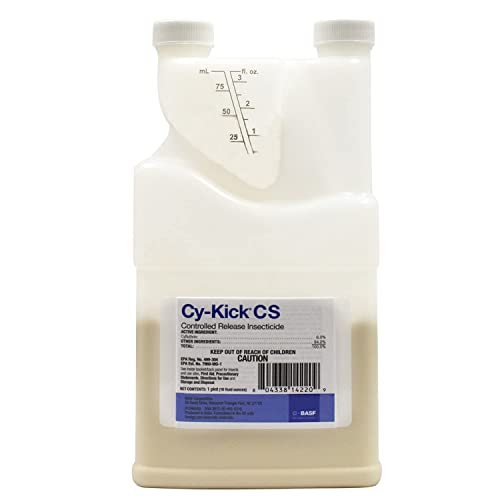Scorpions are a strange lot, being both feared and revered throughout history. In Ancient Egypt, two kings were named Scorpion and became the figures we know today as Osiris and Horus.
Another deity, which Isis worshippers adopted as an incarnation of their goddess, was a trickster that was often associated with the two kinds of scorpion found in that region – one deadly and the other the source of an antivenom that could save someone stung by the first.
Fast-forward to modern times and you’ll find Scorpions on tour and as iconic monsters in franchises such as Fallout.
They’re also one of the more popular edible bugs out there (note: dessert scorpions and other confectionaries have the poison sack removed, so don’t try eating scorpions you caught yourself unless you know what you’re doing!) and even make for great pets.
But how does something so often associated with death end up playing such a wide range of roles in our lives? And what do you do when a scorpion decides it wants to be part of your life without your consent? Keep reading to learn about this critter and how you can get rid of scorpions on your own.
- Kills scorpions, spiders, ants, cockroaches, crickets and other insects on...
- Residual control for up to 6 weeks
- 2-way precision spray nozzle can be applied as a wide spray or into cracks and...
Getting to Know Scorpions
Scorpions are arachnids that range in size from 1/3 inch to over nine inches long. Most species tend to be yellow to brown, allowing them to match their environments.
Note that you might hear of them referred to as arthropods as well. This simply means they come from the Phylum Arthropoda, which includes spiders, millipedes, bees, and other bugs.
US Scorpion Diversity and Range
Globally, there are an estimated 2,500 species of scorpions in 22 families and on every continent except for Australia. This range includes the southern portion of Europe, most of Asia below Russia, and 2/3 of the US extending to just past the southern border of Canada.
There are a little over 90 confirmed species living in the US, and maps of their range can vary greatly, likely due to scorpions hitchhiking to parts of the country they normally don’t live in.
However, most maps tend to draw a rough demarcation line from around Maryland or North Carolina to the northwestern edge of Minnesota with no scorpions living natively north or east of that line.
As with most arachnids, scorpions become sluggish in cold temperatures and will generally avoid the cold. They also hate temperatures above 100 degrees and will try to seek shelter from the heat.
Are Scorpions Dangerous?
That depends upon the species. All scorpions have a venom sac and stinger at the tip of their tail (venom is defined as a biological poison that is delivered through injection).
As is the case with most arachnids, a scorpion’s venom is usually no more powerful than that of a bee or wasp sting. They also tend to hurt about as much.
Globally, there are only about 25 species that are considered deadly to humans, and in the US, there’s only one truly deadly American scorpion that should be feared: the Arizona bark scorpion (Centruroides sculpturatus).
However, the venom of this scorpion has only led to two confirmed deaths since 1968. Its venom is considered potentially life-threatening because it can cause partial paralysis in the region of the sting, as well as difficulty breathing.
You’re most likely to run into one in Arizona, but their range also includes California, New Mexico, and Texas.
Another species with a range that extends into the Midwest, the stripe-bark scorpion (Centruroides vittatus), is also highly venomous and is considered by some to also be deadly.
This particular scorpion is responsible for the majority of sting reports in the US and its venom contains several allergens which can make it more dangerous to hypersensitive individuals.
However, the symptoms (which are nearly identical to the Arizona bark scorpion but slightly more mild) are almost never fatal.
Both of these species are around 2 ¾ to three inches long, have yellowish-tan bodies, and long, thin pinchers. The striped bark scorpion has two darker stripes running down its back.
Treating Scorpion Stings
Treating a scorpion sting can generally be done without medical intervention in a manner not unlike treating bee stings. Begin by washing the wound and use a cold compress to ease the pain and slow down the venom’s spread.
You can take some anti-inflammatories or over-the-counter pain medicine to help with symptoms.
Common symptoms of a scorpion sting include pain, swelling, and often vomiting. However, these symptoms rarely last more than two or three days. You may also have some stiffness, paralysis, or minor convulsions in the limb that was stung, but these will also fade within 72 hours.
Because children, pets, and the elderly are more prone to serious side effects, you should seek medical attention quickly in the event of a sting. Also, healthy adults should seek medical assistance if you weren’t able to spot or identify the guilty scorpion.
On a side note, harmless scorpions tend to have short, thick pinchers similar to a lobster or crab, while deadly scorpions (including both dangerous US species) will have long, thin pincers that look more like scissors or garden shears.
Thus, if you are stung by a scorpion with long and thin pinchers, you should seek medical attention immediately just to be safe.
Does One Scorpion Mean More?
Unfortunately, yes. Scorpions tend to dwell in small groups, gathering where there’s plenty of prey. On top of this, female scorpions give birth to live babies which will ride around on her back until their exoskeletons can harden. If not killed early enough, these babies can easily cause a population explosion.
One important thing to note, however, is that while scorpions often gather on common hunting grounds, they tend to nest separately. This means there could be multiple nests present in your home.
What Attracts Scorpions in the House?
Scorpions are well-adapted to living in dry areas, but they’ll enter your home for the same reason as most other pests, at which time moisture becomes a major attraction. As scorpions are predators, the most common reason they’ll enter your home is when they’re searching for prey.
In addition, they’re primarily nocturnal critters and will seek shelter in cracks, crevasses, and crawl spaces – which can easily include entry points in your home.
See Also: What Do Scorpions Eat?
Do Scorpions Climb Walls?
Scorpions are able to climb walls and other surfaces as long as that surface is sufficiently textured. Smooth metal or glass surfaces, as well as slick surfaces, can prove effective barriers.
Where Do Scorpions Hide?
Just about any dark place can be a good hiding spot for scorpions. Outside, this includes under rocks, debris, or rotting wood.
Indoors, there are plenty of places for them to hide, and they’ll seek out clutter or cracks. This is why they’re often discovered in shoes or piles of clothes.
The bathroom, kitchen, and basement are common hiding spots due to the likely presence of water. They will also take shelter in spots where there’s less human activity such as an attic, crawlspace, closet, or in cabinets.
Are Scorpions Hard to Get Rid Of?
There are all sorts of myths out there claiming that scorpions are very difficult to kill. While it can be a pain (sometimes literally), you can eliminate a scorpion infestation with a little patience using the same methods you’d use for most arachnids or insects.
The real reason killing scorpions is more difficult is simply due to how they carry themselves. Most insects and arachnids will scurry along with their bodies low to the ground or even touching.
As a result, more of their body will touch contact poisons or substances such as diatomaceous earth. However, scorpions walk “on their toes”, holding their bodies above the ground in a manner that makes contact-based methods less effective.
Add to this the fact that scorpions give live birth to dozens of babies, can survive up to a year without food, are resistant to many environmental conditions, and live for up to 15 years.
Scorpion Fun Facts
Speaking of facts, here are a few more fascinating facts about these critters.
Chemical Cocktail
When you think of venom, you probably think of it as a single toxin. The painful stings of a scorpion are rather different. They can contain a complex cocktail of different toxins at once.
Each toxin can have its own effects, which is why it’s so hard to predict how a person will react to a scorpion sting. It also helps them fend off foes that are resistant to particular toxins.
Glow Scorpions
Much like bed bugs and a few other critters, you can actually use black lights to spot a scorpion at night. This due to fluorescent chemicals in their exoskeleton which glow when hit by UV rays.
Living Fossils
There are a few critters out there that existed with the dinosaurs, but few are as old as scorpions. So far, more than 100 fossil species have been described, with the oldest (Dolichophonus loudonensis) living somewhere between 443.8 and 419.2 million years ago!
Mama’s Boys (and Girls)
Not only do scorpions give live birth, they also carry their young around to protect them while their exoskeletons harden. In some species, a baby scorpion will remain with its mother for as long as two years.
Venom Conservation
When getting stung by wasps, you’ll get multiple small doses. A bee’s stinger will be ripped away with the venom sack, causing it to continue injecting toxins into your body.
But scorpions are rather different. They can actually control the amount of venom they release. Since it takes time for the venom sack to refill, these critters (much like skunks) will use their most famous weapon as a last resort.
Venom Value
Finally, do you remember when we mentioned how the Egyptian gods could be traced back to actual historic figures from Dynasty 0 and several were linked to scorpions? It turns out the stories of Isis using scorpion venom to heal isn’t so far-fetched.
Medical science has been studying their venom for some time, with potential uses ranging from antifungal and antiviral medications to therapeutic drugs and even as cancer treatments. One of these is chlorotoxin, which is currently in clinical trials as a treatment for brain cancer.
Getting Rid of Scorpions
Getting scorpions out of your home isn’t easy, but it can be done. The more frustrating task is getting them out of your yard.
Of course, the first and most important step is to find where the scorpions are nesting. After that, it’s mainly a matter of patience or getting directly involved against these critters.
How to Find a Scorpion Nest
Scorpions don’t make their presence as obvious as insects or spiders, so searching for its nest requires a lot of cleaning and patience.
Begin by donning some long, thick gloves to avoid getting stung. If you plan to kill or capture on sight, have your pesticidal spray or glass jar on hand (we’ll talk a bit more about these later). You may also wish to have a UV light to aid in your search.
Indoors
Start with your dirty clothes. Pick them up one-by-one and shake them out, as well as knocking any shoes or boots. Place them in a garbage bag or Tupperware container so a scorpion can’t sneak into them as you work.
Clean up all trash, sweep and vacuum. Not only can this scare a scorpion out into the open if its hiding in debris, it will also help you discover any other pests the scorpions might be feeding on.
As you work, don’t forget to strip the bed and check all closets. Since a scorpion may have recently gotten inside, you might not find a nest even if you spot a scorpion.
Outdoors
Outside, the process is pretty much the same. Wear some boots and long pants so the scorpion can’t sting if you get too close.
Remove all debris, prune back plants, and keep the grass short. Avoid leaving sources of water which can attract bugs and turn off any outdoor lights when not actively using them.
Scorpions are most likely to nest in small holes or crevasses, although they can take shelter anywhere that’s sufficiently sheltered from predators, light, and temperatures. This is also how they often end up in your home by accident.
Getting Rid of Scorpions in the Home
There are five methods for killing a scorpion in your home, each of which has its own pros and cons.
Method #1 – Squishing or Stabbing
This is perhaps the messiest method, and you need to be careful not to try and squash a scorpion with your bare hands or feet. Simply use a shoe or other object to smash the scorpion where it stands, then carefully clean up the mess.
It can be a little tricky sneaking up on your prey, although you can take advantage of the fact that it will usually strike a warning pose before running.
You can also spear a scorpion if you have good reflexes. Knives, long tweezers, or other long, sharp objects can be very effective. Just remember to wear some form of protection in case the scorpion is able to reach your hand. You’ll also want to clean your murder tool afterwards.
Method #2 – Sticking
As with many home invaders, scorpions can be caught using glue traps. If you have some gloves, you can even drop duct tape on one and use a second piece to ball it up and throw it out.
Sticky traps can be a pain if you have pets or small kids, although they’re an excellent choice for surfaces and spaces your smaller family members can’t reach. Just be warned, even a dead scorpion still has a stinger, so collect the corpses with care.
- READY TO USE: Spider, Rodent and Insect glue traps are pre-scented and are...
- YEAR ROUND PROTECTION: Catchmaster glue traps are safe, non-toxic and no-mess....
- SAFE FOR THE FAMILY: Designed to help you keep your family protected and safe...
Method #3 – Spraying
Pesticides marked for use on arachnids or scorpions on the label can be used to kill these critters quickly. The downside is that they often leave toxic residue that needs to be cleaned up.
In addition, you have to hit the scorpion directly and it may flee before the spray takes effect (which means you may have to locate the corpse). On the bright side, hitting a mother and her babies can easily kill off most or all of the baby scorpions, even though they’ll inadvertently protect their mother.
If you only have a small scorpion problem, 1 can of Terro spray should do the trick. For larger scorpion infestations, it’s hard to beat a commercial-grade insecticide like MGK Onslaught FastCap.
Method #4 – Dusting
This is the method most responsible for people thinking scorpions are hard to kill because insecticidal dusts (like Delta Dust) and diatomaceous earth aren’t nearly as effective as they are on other arachnids and insects. As mentioned, this is due to the fact that scorpions hold their bodies above the ground.
However, that’s not to say dusting doesn’t work – it just takes longer because the scorpion is exposed to less of the dust at a time. As a result, dusting near baseboards or in closets can be a great option if you think there might be more in the house.
Method #5 – Capture and Release
Scorpions aren’t malicious, so you might decide to show a little sympathy. You can do so by quickly putting a wide-mouthed glass jar over one. Once it’s trapped in the jar, slide a sturdy piece of card stock (like junk mail from a local realtor) underneath and flip the jar over with the card stock on top.
Carefully transport your little captive off of the property and let it go. Just remember to wear some thick gloves and use caution to avoid getting stung.
Getting Rid of Scorpions in the Yard
Outdoors, it’s a little more difficult to eliminate scorpions, so your focus should be on giving them less reason to visit. Remember, these critters are actually beneficial, as they eat all sorts of insect pests, so there’s no need to declare war. Instead, try these tricks:
Method #1 – Residual Insecticides
A residual insecticide sprayed around your home’s foundation can protect it from both scorpions and their prey. You can also use powders, although these are more prone to getting washed away by the rain.
Aim for products containing cyfluthrin (like Cy-Kick CS), which is not only effective against scorpions but mosquitoes and a few other little nasties as well.
- Cyfluthrin 6.0%
- Cykick Cs Can Be Used Indoors And Outdoors To Control All Types Of Pests.
- Low Mix Rate: To Get A 0.05% Solution Mix Cy-Kick Cs Insecticide At A Rate Of 1...
Method #2 – Happy Smells
Lavender and cedarwood are not only relaxing, they’re great for repelling scorpions. You can use plants or blocks and chips, as well as essential oils. Other useful essential oils are cinnamon and peppermint.
Method #3 – Exterminate!
There are many exterminators that specialize in scorpion control in the Southwest. However, a lot of pest control companies offer scorpion removal services. Chickens and cats are also effective scorpion killers, but can be seriously injured if stung.
Keeping Scorpions Away
As mentioned, scorpions will enter your property or home looking for food and shelter. By maintaining your lawn and garden areas, scorpions are less likely to venture onto your land.
You will also want to seal any potential entry points to the home, such as filling all cracks and crevasses, caulking and weatherproofing doors and windows, ensuring all screens are intact, etc.
Keep all window panes clean and remove any standing water. These simple preventative measures can also keep other pests outside.
- How to Get Rid of Hawks - March 8, 2024
- How to Get Rid of Pill Bugs (Rolly Pollies) - March 1, 2024
- How to Get Rid of Groundhogs (Woodchucks) - February 5, 2024

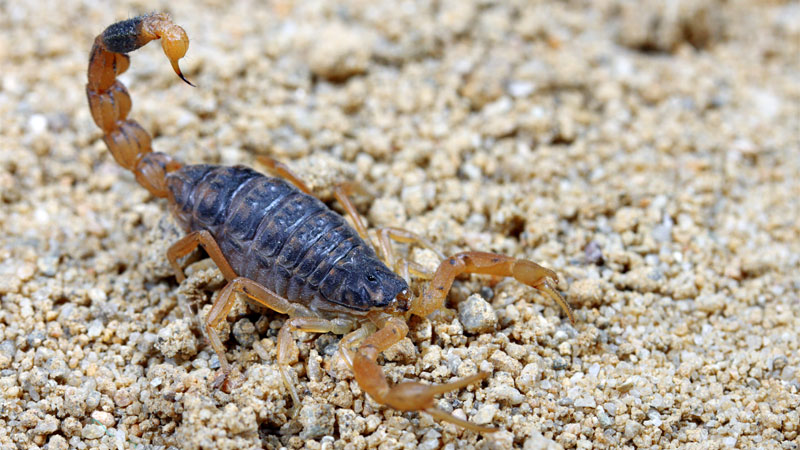
 Just tell me how to get rid of ’em.
Just tell me how to get rid of ’em.
